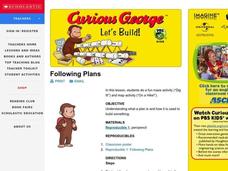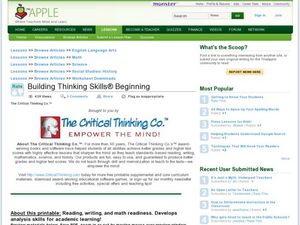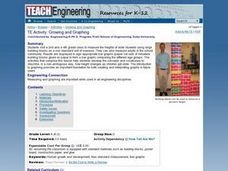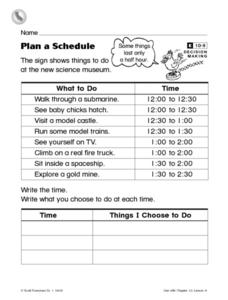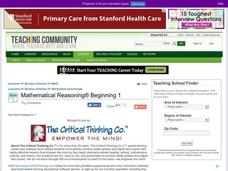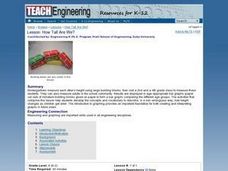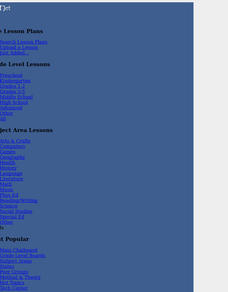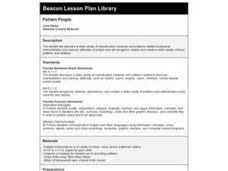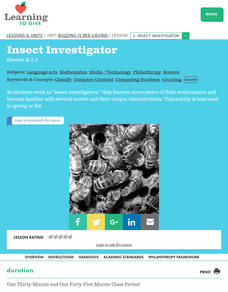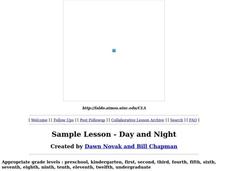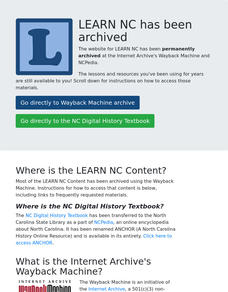Curated OER
Where Does the Green Go?
Students investigate why green leaves change colors in the fall. They press leaves and write a poem, create a chlorophyll leaf print, take a nature walk, and create a leaf shape poster.
Curated OER
What Do Trees Do for Dinner?
Students investigate how trees produce their own food. They examine chlorophyll cells with a microscope, analyze a cross section of a log, determine how old the tree was, simulate the distance of the roots, and create a play.
Curated OER
Popcorn
Learners discuss the properties of popcorn. They explore the connection between corn, popcorn and Thanksgiving. As a class, students sing a popcorn song and create a popcorn craft. They practice writing the word popcorn. As a...
Curated OER
Let's Build
Students observe and discuss a picture of Curious George building a bridge and discuss what it means to build, plan and design a project. As a class, they list things they need to do in oder to build something and explore how a compass...
Curated OER
Thinking Skills: Connecting shapes
In this thinking skills instructional activity, students draw a line connecting each blue figure without touching any other color. Students connect 4 figures.
Curated OER
Animal Babies
In this animals worksheet, students play a matching game much like the game memory where they match the animals to their babies. Students match as many cards as they put out.
Curated OER
Dinosaur Prints
Students examine dinosaur footprints and compare them to the shape of elephant footprints and to the size of their own footprints.
Curated OER
Growing and Graphing
Pupils visit a 2nd and a 4th grade class to measure the heights of older students using large building blocks as a non-standard unit of measure. They can also measure adults in the school community. Results are displayed in...
Curated OER
How Big is the Sun? Exploring the Size and Scale of the Sun, Earth and Moon
Students explore the relative sizes of the Sun, Earth and Moon as they make an impressive large-scale model for classroom use throughout the unit.
Curated OER
Farm Animals
First graders use this Web Quest to find out about 6 different farm animals. They explore what each animal eats and what food humans get from each animal. They study about are pigs, sheep, goats, horses, cows, and chickens.
Curated OER
Repeating Patterns
Pupils explore growth patterns by using manipulatives such as pattern blocks, investigate growth pattern of pattern, record growth in T-chart, describe how pattern is growing, and predict number of blocks needed to extend pattern.
Curated OER
Plan a Schedule
In this daily schedule worksheet, students analyze a chart that shows a schedule for events at a museum. Students plan a visit by making a schedule of events they would like in their own schedule.
Curated OER
Number Sense
In this ordinal numbers practice worksheet, students respond to 5 questions that require them to identify the first, second, third, fourth, and fifth fish in 5 lines of fish.
Curated OER
Mathematical Reasoning
In this data analysis worksheet, students read a list of 4 criteria and then select the picture on the sheet that matches the criteria.
Curated OER
Com-Post With Us? Learn About Recycling While Having Fun
Young scholars examine the importance of recycling to help the environment. In groups, they make a compost bin on the school grounds recording how the material changes from week to week. They collect other materials for recycling like...
Curated OER
Dinosaurs - Creatures Of The Past
Pupils use the Internet to search for dinosaurs, then distinguish between meat-eating and plant-eating dinosaurs. They explore theories about the extinction of dinosaurs and create illustrations of dinosaurs using Kid Pix or other...
Curated OER
How Tall Are We?
Students in a Kindergarten class measure each other's height using large building blocks and then visit a 2nd and a 4th grade class to measure those students. They display the results in bar graphs, comparing the different age groups.
Curated OER
H2O in Us
Students discover through this activity that all organisms are composed of water. They find that 70 percent of their bodies are made up of water that is in thier cells and blood, and not free-flowing throughout their body.
Curated OER
Who Needs What?
Learners identify the physical needs of animals and if plants need the same things as animals. They conduct an experiment to see if plants need light and water to grow. They compare the growth of the plants exposed to the different...
Curated OER
How big is a whale
Students research the size of whales using print books or the internet. Students do the research in groups. They compare and graph the results.
Curated OER
Pattern People
Students describe a wide variety of classification schemes and patterns related to physical characteristics and sensory attributes of people. They recognize, extend and create a wide variety of those patterns and relations.
Curated OER
Insect Investigator
Students examine and identify common insects. They observe these insects in their environment and keep track of how many they see. They use magnifying glasses and special hats to get into the role of an inspector.
Curated OER
Day and Night
Students discuss why day and night occur after visualizing a teacher-led demonstration.
Curated OER
Chilly Discoveries
First graders make ice cream and determine what makes this liquid turn into a solid.



